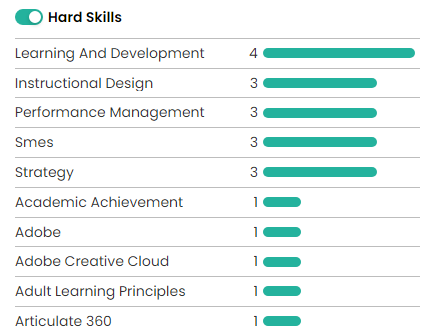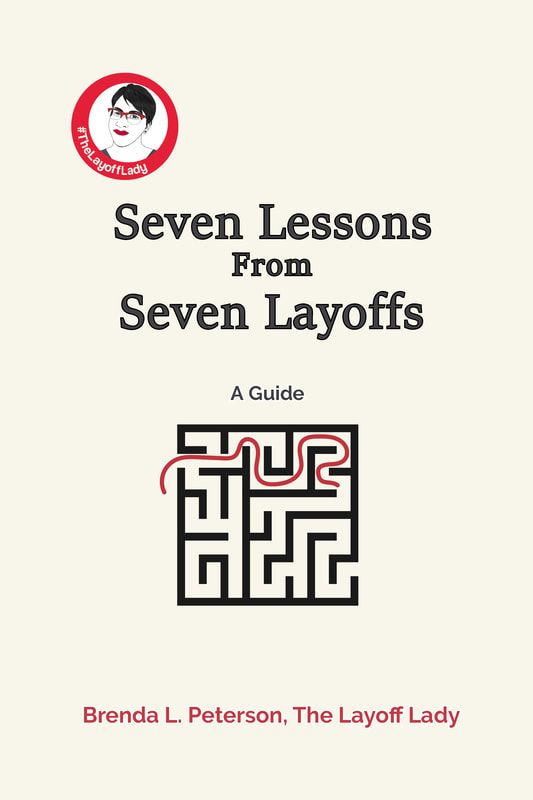|
by Brenda L. Peterson, The Layoff Lady Learning About YourselfThe first step of job searching is figuring out what kind of a role you even want. Instead of jumping right into the job you did before, taking a little time for introspection is wise. One good step in this process is finding out more about your strengths. Learning about what you are good at--and how to tell the story of your talents and successes--can help you position yourself well as you apply and interview for a new role. People Are Good at Different ThingsIf you ask many people what they are good at, they would need help putting their natural abilities into words. Taking the StrengthsFinder assessment was a great starting point for me to better understand what I do well. Often, individuals are blind to their own unique talents. In the past, I have wrongly assumed that EVERYONE does the things I do. Like (of course) everyone takes notes regularly in everyday conversations when they learn something--and (of course) everyone makes a seating chart whenever they are in a group of new people to remember names. Turns out--NOPE! These are things I did that not everyone does. This was a huge breakthrough for me. So how do you figure out what you do that not everyone does? Part of the Answer: CliftonStrengths AssessmentThe CliftonStrengths Assessment (previously known as Clifton StrengthsFinder) is a wonderful tool for identifying what you are good at, how that manifests, and how your version of each strength shows up. The 30-minute online assessment includes 177 questions, including paired statements. Then, on a scale, you select which of the statements is more like you. From there, you'll receive a report identifying your top five strengths along with a more detailed description of how those strengths are exhibited in how you interact with the world. Reading a report about yourself (one that is freakishly accurate, by the way) is downright life-changing. After taking the assessment, you'll be able to see your unique talents and have language to explain how what you do sets you apart from others. Having a way to put your abilities into words can translate directly into your resume and how you talk about who you are and what you bring to the table. My Strengths and How They Show UpMy identified strengths, in order, are Strategic, Learner, Arranger, Achiever, and Individualization. Here are a few details I learned from my report and reflecting on those results:
More Strategies for Finding Strengths and TalentsHere are a few other strategies for identifying what you're good at and how you show up in the world:
Learn More
0 Comments
By Brenda L. Peterson, The Layoff Lady All The FeelsWhether due to an economic downturn, an acquisition, or a company reorganization, layoffs hapen all the time. Each person will experience a range of emotions when it happens to them. Even for someone who has gone through a layoff before, it is a tumultuous experience each and every time. Here is the good, the bad, and the ugly of the feelings people often experience surrounding an unplanned job loss. ShockThe phone call from HR, the perp walk through the office to the dreaded conference room, the last-minute ominous meeting invite, or the oddly timed tap on the shoulder all seem to come out of nowhere. There is something surreal about being pulled into a virtual or in-person room and having someone look you dead in the eye and tell you that you are going to go through a significant life change starting, well, now. Even if there were layoff rumors, news about leadership changes, or low sales reported for the quarter, it’s always a surprise on the date and time when layoffs go down. It’s the feeling of the ground being pulled out from under you. It’s the gap between expecting a full day of meetings and finding yourself in your car mid-morning with a white box. AngerEven if you were actively looking for a new role, a certain amount of anger goes along with a layoff. It could be frustrating learning about the people who didn’t get laid off (like that guy whose messes you've been cleaning up for the last year) and comparing your perceived value to theirs. It could be irritation at the timing (right after vacation, right before a holiday) and how that makes finding something new an even longer process. It might be the insult to injury when you realize that yesterday’s mission-critical work-all-night project has become irrelevant. In many cases, it might just be the maddening nature of someone else deciding when you don't get to do that job anymore instead of you getting to choose when it was time. Feeling that lack of control can be the most challenging part. SadnessExiting a job abruptly leaves a big hole in your life, starting with a 9+ hour workday being replaced with dead air and uncertainty. People who earlier that day were coworkers, casual work friendships, or confidants now may be nothing at all now that you no longer share an employer. The consistency of a morning routine, daily commute, and regularly scheduled meetings are replaced with a battle with the unknown that may last a week or a year. Sometimes, it’s easy to be hopeful about the future, and other times, it’s hard not to be mired in sadness about all the things you can’t control. FearThere is plenty to be afraid of. First, the idea of not having a paycheck is horrifying. Not knowing how long your severance check has to last is unnerving. Not having any idea how long your jobless period will last and what job you’ll end up with is sometimes unbearable. You may fear being unemployed endlessly and not being able to support yourself. You might worry about panicking and taking the first job offered to you. You could worry about holding out for something closer to the “perfect” job that may never come. You may even fear you will never get a job as good as the one you just had. On the worst days, when fear has given way to full-on catastrophizing, you could worry that you will lose your house, car, professional reputation, and everyone you've ever loved. ReliefHere's the one that might seem unexpected. If you've been at a company and "made it" through multiple rounds of layoffs, you may be waiting for your luck to run out. While you're certainly relieved to still be employed, each time you hear rumblings about reorganizations or start seeing those empty white dots pop up on Microsoft Teams, you may have had that sick feeling in the pit of your stomach waiting for it to be your turn. The strange benefit of finally being laid off is that you don't have to worry if it will happen (and when) because it just happened. At that moment, you also realize it's not as bad as you imagined, and now what there is to do is pick yourself up and create your fantastic new future. The Good NewsThrough the tumult of emotions, it’s important to acknowledge each one and process those feelings. From there, you can think about what is next for you and focuson your next steps toward the next right job for you. Learn More
by Brenda L. Peterson, The Layoff Lady Welcome To The SuckWhether you are in career transition and looking for a new job, or employed and looking for something new, job searching is always challenging--partly due to all of the uncertainty you'll face as you "wait for your life to start again" as you search for the next right role fro you. Suffice it to say that job searching can be full of obstacles that make the process hard to manage. Knowing the possible issues is the first step towards figuring out how to mitigate each challenge and move forward. Here are five unfortunate reasons I have discovered while working through job transitions and a few coping strategies for dealing with each. Reason 1: You Won't Always Interview For "The Perfect Job."Congratulations! You just found THE PERFECT JOB! You have all of the required and preferred qualifications! It's at the right level with your dream company, and you even know someone who works there who will say great things about you! Surely your days of job searching are coming to a close because you are the purple squirrel for THE PERFECT JOB! Enter reality. I'm sorry to say that you may not even manage to get so much as an initial phone screen for this position. Even when you feel like the job was tailor-made for you, it may not work out the way you want. Why might that happen? For one, the position may not actually be available. Some organizations post job openings to gauge interest in the position even though they have no solid plans to hire anytime soon. Conversely, the role may have been open for a while, and the selection process may be well underway. There could also be an internal person who will take the job without additional people being considered. In some cases, companies may have a policy that they need to post positions externally for a given length of time, even though they already have a candidate in mind. Still other organizations may decide part way through the hiring process to leave a position unfilled but not remove it from their posted jobs right away. Assuming the job is really, and for true accepting applicants, there may still be issues. For one, key organizational stakeholders may lack common agreement on what a job role will do and what constitutes being a well-qualified candidate. Decision makers may also each have their own non-negotiable requirements for the qualifications for the potential hire--which may or may not relate to the person's ability to do the job. Remember that no matter what the issue is, it seldom has anything to do with you personally. It's just the life of recruiting for and trying to fill positions with the best candidates they can find--sometimes with people who are (unfortunately) not you. Coping Strategies
Reason 2: People Who Aren't Great At Their Jobs Will Make It Hard.Remember a time at your last job when you had to deal with someone who was not great at what they did for a living? Like the rude salesperson who didn't do their paperwork correctly and caused you to lose out on a great deal? Or the manager who approved your time off request months ago, then decided to "unapprove" it a week before your vacation? During your job search, you'll realize those people exist in other organizations, too, and they sometimes stand between you and the job you want. It could come in the form of an administrative assistant who is supposed to coordinate your travel for an in-person interview--who didn't make reservations and then went on vacation, leaving you scrambling to find someone else to help. It might be the person conducting initial phone interviews who didn't realize that learning experience design and instructional design were the same thing and screened you out. It may even be an insecure possible future coworker who wants to avoid hiring someone who might outshine them. Like the rest of life, things are not always "fair." You may not get the job, even if you are a strong candidate. And so it goes. Coping Strategies
Reason 3: Along The Way, Someone Will Dislike You.I don't know about you, but I am friggin' delightful. I'm also able to connect and get along well with most people. However, during the interview process, no matter who I am or am not, it will not match what someone else thinks the candidate for the position should be. Whether they thought I should have smiled more, made a different outfit choice, or given more detailed examples, someone's negative reaction to who I am may take me out of the running for a job. People often have their own pet theories about what they'd like in a coworker, manager, or direct report. They may be convinced that having the title "account manager" is pivotal for success, that all candidates must have a master's degree, or that people who ride horses are pretentious. You might also have the misfortune of reminding them of the mean girl in high school and BOOM--instant dislike. Again, life isn't necessarily "fair." Coping Strategies
Reason 4. The Process May Be All Over The Place.The job interview process can be anything from one interview to many, many, many interviews, depending on the organization and the role. Typically, I expect to have a phone screen with an entry-level HR person to confirm that I can speak in sentences, an in-person interview with the manager and potential coworkers, and a final interview to demonstrate skills and/or meet with a company VP. In addition, a given employer may want you to do more to show that you have the skills necessary to do the job. For example, you might be asked to pass written assessments, submit work samples, present to a group or complete a project. They may even have you come into the office for the day and "work" as if you are already in the position you are applying for. Interviews could take place over the phone, via web conference, through email, in person, or (more likely) a combination of all of the above. Some companies will have a pre-defined, structured process for the pacing and format of interviews. Other organizations will appear to be making it up as they go along. You may also inadvertently skip steps and realize near the end of the process that you should have talked about a basic topic like salary range or work location. Sometimes, it may seem that the interview process is never-ending because you have yet to talk with every single person in the organization. Coping Strategies
Reason 5: Their "Fast" And Yours May Be Different.I remember being a child and how LONG the year seemed. It always took forever to get from my birthday at the end of August to Christmas. Enter adulthood. I find myself consistently marveling that it's already whatever day/month/season it is because it seems it was just that other day/month/season. In this scenario, your employer is the adult, and you are the child. Some companies will be motivated to fill positions and move quickly. In contrast, others might have days, weeks, or even months between your contact with them--all because something that wasn't filling that position became a priority. What about that two days the employer estimated it would take them to contact you? It may turn into a week or two. Since they're busy addressing customer issues, traveling to client sites, and doing their expense reports, they didn't even realize it took that long. Or, as any job seeker doesn't want to hear, you may not be getting the job. Responding to a candidate quickly usually shows that the potential employer is interested. In many cases, taking longer to respond may indicate lagging interest. Such is how the whole process works. Coping Strategies
Learn MoreBy Brenda L. Peterson, The Layoff Lady So Many Openings!Depending on your chosen field, and your preferred work arrangements, there are a lot of jobs for which you could apply. While remote work availability gives each job applicant many more work options, figuring out how to prioritize open positions can be overwhelming. Here is my recommendation for evaluating open roles and prioritizing which job applications you submit. Searching for Available JobsIn this scenario, we'll look at how someone in a role as a Training Specialist can sort through a the sea of job listings and prioritize which openings should recive applications. To begin, I searched on Indeed.com for the job title Training Specialist. This search generated these results:
Without superpowers, it is not feasible to apply for 631 jobs in one week. Time to Apply and Available TimePersonally, when I decide to apply for a given role, I take about 30 minutes to research the company, customize my resume, and complete my formal application. In a given week, there are 7 days, which is 168 hours. There are not enough hours in a week for me to apply for that many jobs. Even if I somehow managed not to eat, sleep, or do even the most basic self-care, I could only apply for 336 jobs. Closer to the realm of feasibility, if I decided to dedicate a full 40 hours per week solely to applying for jobs, I could apply for 80 jobs—but definitely not well. In addition, working this long and this hard solely on submitting applications can put you on the fast track to burnout. Even half that, dedicating 20 hours solely to applying for jobs, and applying for 40 jobs in a given week, is most likely overkill. More Is Not Necessarily BetterThe more jobs I try to apply for in rapid succession, the less effective I am. While applying for jobs is in some respects, a numbers game, it’s not as easy as applying to all the jobs and knowing that one will work out. This strategy often causes people to waste time applying for roles that aren't a close enough fit. A better strategy is to prioritize jobs that are the best match for your skills and what you want and focus on applying for those well. When I'm in career transition, my goal is usually to apply for three jobs per week. However, if I see several great opportunities or have not searched for a job in a while, I may apply for as many as six. Beyond that, though, my application quality suffers. Prioritizing ApplicationsTo apply for jobs well, you need to determine the best way to prioritize your applications. Instead of the “spray and pray” approach, think through what you want and apply with more purpose. This approach favors quality over quantity and will help you focus your efforts on where you can get better overall results for your time investment. Step 1: Know Key Characteristics of What You WantEarly in your job search, it’s essential to do at least a little soul-searching and be able to articulate what you want. This may include revisiting your values, identifying your strengths, and thinking about the work you enjoy. For example, earlier career Brenda would have a list something like this on what she wanted from a role:
Having a stated list of preferences, and continuing to hone it as you learn more, is your first step in determining which jobs to target. Step 2: Narrowing Your SearchLet's go back to those 631 search results from my Training Specialist searches. By adding additional search parameters, we can narrow our results to jobs that more specifically meet our criteria: Starting with those 43 roles in Omaha:
Starting with those 588 remote jobs:
Step 3: Quick Job Listing ReviewNow that I have a more reasonable number of jobs to go through (12 and 45--57 total), I start to do a cursory review of the short descriptions of each role. No
Yes
I have now reduced the number of jobs that interest me to 31 roles. Step 4: More Detailed Job Listing ReviewNow that I have those 31 jobs in Teal, I look more closely at the following:
I remove jobs where I am not eligible. This includes the following:
I remove jobs with anything that might be a dealbreaker for me. This includes the following:
For the remaining jobs, I give them an initial rating of 1-5 stars and make notes on any areas I might want to explore further. I now have 18 jobs in Teal. Step 5: A Little More ResearchNext, I investigate a few things outside of the immediate job descriptions.
Now, I have 13 jobs In Teal. Step 6: Customize a Resume and Prepare to ApplyFrom the 13 jobs I have listed, I will apply for the jobs I'm most excited about and continue to reassess other openings listed. I will also add, remove, reprioritize, and take notes on specific roles as needed. Learn More |

Just get laid off?
Click here for info on what to do first. Author7-time layoff survivor Brenda L. Peterson, The Layoff Lady, waxes poetic on layoffs, job transitions, & career resilience. Buy The Book!Were you recently laid off from your job and need a roadmap for what's next? Pick up a copy of my book, Seven Lessons From Seven Layoffs: A Guide!
Categories
All
Archives
July 2024
|










